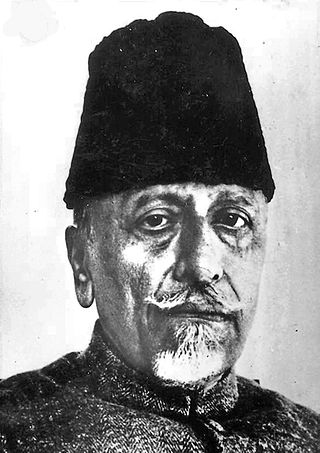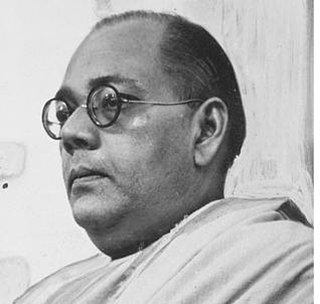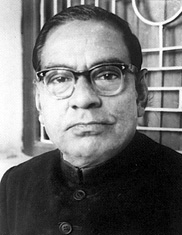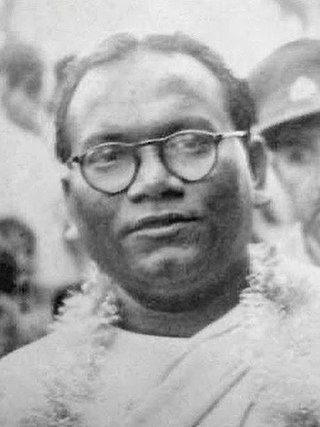Related Research Articles

The All India Forward Bloc is a left-wing nationalist political party in India. It emerged as a faction within the Indian National Congress in 1939, led by Subhas Chandra Bose. The party re-established as an independent political party after the independence of India. It has its main stronghold in West Bengal. The party's current Secretary-General is G. Devarajan. Veteran Indian politicians Sarat Chandra Bose and Chitta Basu had been the stalwarts of the party in independent India.

Abul Kalam Ghulam Muhiyuddin Ahmed bin Khairuddin Al-Hussaini Azad ; 11 November 1888 – 22 February 1958) was an Indian independence activist, writer and a senior leader of the Indian National Congress. Following India's independence, he became the First Minister of Education in the Indian government. He is commonly remembered as Maulana Azad; the word Maulana is an honorific meaning 'Our Master' and he had adopted Azad (Free) as his pen name. His contribution to establishing the education foundation in India is recognised by celebrating his birthday as National Education Day across India.

Sarat Chandra Bose was an Indian barrister and independence activist.

Abul Mansur Ahmad, born Ahmad Ali Farazi, was a Bangladeshi politician, writer, and journalist.

Jogendranath Mandal, was one of the founding fathers of the modern state of Pakistan, and legislator serving as country's first minister of law and labour, and also was second minister of Commonwealth and Kashmir affairs. In the cabinet of Interim Government of India, He got the law portfolio before. As a leader of the Scheduled Castes (Dalits), Jogendranath Mandal campaigned against the division of Bengal in 1947, believing that the divided Bengal would mean that Dalits would be at the mercy of the Muslim majority in East Bengal (Pakistan), and at the thraldom of majority caste-Hindus in West Bengal (India). In the end, he decided to maintain his base in East Pakistan, hoping that the Dalits would be benefited from it and joined the first cabinet in Pakistan as the Minister of Law and Labour. He migrated to India a few years after partition after submitting his resignation to Liaquat Ali Khan, the then Prime Minister of Pakistan, citing the anti-Dalits bias of Pakistani administration.

Bengali nationalism is a form of nationalism that focuses on Bengalis as a singular nation. The people of Bengali ethnicity speak Bengali language. Bengalis mostly live across Bangladesh and the Indian states of Tripura and West Bengal. Bengali nationalism is one of the four fundamental principles according to the original Constitution of Bangladesh. and was the main driving force behind the creation of the Independent nation state of Bangladesh through the 1971 liberation war.
United Bengal was a proposal to transform Bengal Province into an undivided, sovereign state at the time of the Partition of India in 1947. It sought to prevent the division of Bengal on religious grounds. The proposed state was to be called the Free State of Bengal. A confessionalist political system was mooted. The proposal was not put up for a vote. The British government proceeded to partition Bengal in accordance with the Mountbatten Plan and Radcliffe Line.
Barun De was an Indian historian. He served as the first professor of social and economic history of the Indian Institute of Management, Calcutta, founder-director of the Centre for Studies in Social Sciences, Calcutta and the Maulana Abul Kalam Azad Institute of Asian Studies, Kolkata and as the honorary state editor for the West Bengal District Gazetteers. He was chairman of the West Bengal Heritage Commission.

The Maulana Abul Kalam Azad Institute of Asian Studies is an autonomous research institute based in Kolkata. It is funded by the Ministry of Culture of the Government of India. It was founded on 4 January 1993. The foundation stone of the institute was laid where the new building now stands on 12 March 1993. It is devoted to the study of the life and works of Maulana Abul Kalam Azad, the eminent nationalist leader and India's first education minister, after whom it is named, and to the furtherance of Area Studies, with special reference to South Asia, Central Asia and West Asia, especially dealing with social, cultural, economic, political and administrative developments in Asia from the nineteenth century to the present. M.Phil.- and Ph.D.-level students of the University of Calcutta, Jadavpur University and Jawaharlal Nehru University, New Delhi are also associated with it.
Jalpaiguri Assembly constituency is an assembly constituency in Jalpaiguri district in the Indian state of West Bengal. It is reserved for scheduled castes.
Nabagram Assembly constituency is an assembly constituency in Murshidabad district in the Indian state of West Bengal. It is reserved for scheduled castes.
Ranaghat Uttar Purba Assembly constituency is an assembly constituency in Nadia district in the Indian state of West Bengal. It is reserved for scheduled castes.
Ranaghat Dakshin is a Vidhan Sabha constituency in Nadia district in the Indian state of West Bengal. It is reserved for scheduled castes.
Bagdah Assembly constituency is an assembly constituency in North 24 Parganas district in the Indian state of West Bengal. It is reserved for scheduled castes.
Sandeshkhali Assembly constituency is an assembly constituency in North 24 Parganas district in the Indian state of West Bengal. It is reserved for scheduled tribes.
Azad may refer to:
Harendra Kumar Sur was an anti-colonial Bengali politician, and a representative of East Pakistan to the Constituent Assembly of Pakistan.
Akshay Kumar Das was a Bengali Dalit politician of Pakistan, who served as a representative of East Pakistan in both the First and Second Constituent Assemblies, and held multiple ministries across the 1950s in governments formed by different political parties.
References
- 1 2 Chatterjee, Pranab Kumar (April–September 1994). "Subhas Chandra Bose and Complexities in the Bengal Congress–1939-1940". The Quarterly Review of Historical Studies. 34 (1 & 2): 57.
Jnanendra Chandra Majumder, a Bose-group candidate, defeated his rival, the official Congress candidate Satish Chandra Ray Chowdhury, by a big margin in the bye-election from the non-Muslim general constituency of East Mymensingh.
- 1 2 3 Azad, Maulana Abul Kalam (1957). "Maulana Abul Kalam Azad's reaction on the action taken against Mr. Sarat Bose by the Congress Working Committee". In Kumar, Ravindra (ed.). The Selected Works Of Maulana Abul Kalam Azad. Vol. X. Atlantic Publishers and Distributors. pp. 195–197.
- ↑ Return showing the results of Elections in India: 1937 (PDF). London: His Majesty's Stationery Office. November 1937. p. 4.
- 1 2 "Vol. III of Press Information Bureau's Morgue and Ref Series: (1) Analysis of the Results of General Elections to the Central and Provincial Legislatures Held In 1945-46 (2) Indian Political Parties, and (3) Provincial Minstries 1937-45". Home Political, ID: HOME_POLITICAL_I_1945_NA_F-79-46. National Archive of India.
- ↑ Rao, B. Shiva (1968). The Framing of India's Constitution: A Study. Nasik, India: The Indian Institute of Public Administration. pp. 93–95.
- ↑ Rao, B. Shiva (1968). The Framing of India's Constitution: Select Documents. Vol. I. Nasik, India: The Indian Institute of Public Administration. p. 309.
- ↑ "Pakistan". The Commonwealth Relations Office List 1952. London: Her Majesty's Stationery Office. 1952. p. 171.